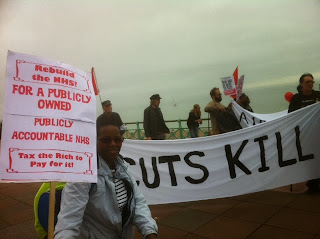The successful Fife appeals strongly support that view and in fact ruled that way though feel forgiven reader if you missed it as everybody did. So many never got my point of argument before about the sham of the decision-making process and chose to focus on bedroom size issues – which they said would never happen!! – And the size issue is and always has been just one part of the sham of a decision-making process (DMP).
To put this very simply if you have a 3 bedroom house and all 3 bedrooms are the size of football pitches your bedroom tax decision is still wrong in law and is a sham decision. This is because the one and only decision-maker, the council, never asked you their size. The councils never asked you about the room purpose either or whether it was appropriate for these rooms to be deemed a bedroom or whether they were fit for the purpose of being a bedroom or what the rooms were used for.
The size, the purpose, the appropriateness and room usage are all constituent elements of what a bedroom is the judge ruled -and the council decision-makers in all housing benefit departments never asked the tenant about these issues and that is why the decision-making process was a sham – and why all 660,000 should appeal their decisions.
The reason why they never asked is because it would have been too costly and an administrative burden. Yet that is no excuse in law, explanation perhaps but not excuse.
All of the councils accepted the word of the landlords and all of them said the room size standards do not apply as they are not in Housing Benefit Regulations (HBR) yet judge Simon Collins QC said the size standards are clearly in HBR.
In the David Nelson case the judgment at paragraph 23 says the judge rules:
“…I would accept that the disputed room is of a size that would normally be regarded as too small to be used as an adult bedroom. I accept that the thrust of Mr Sutherland’s submission here, namely that under-occupancy can be seen as the flip side of overcrowding, and that it is relevant to have regard to statutory space standards. These indicate that a room of this size is appropriate for use as sleeping accommodation by a young child but not an adult. It is in effect regarded by section 137 of the 1987 Act as only half a room.”
Those first four sentences everyone focuses upon as they state unambiguously that a bedroom for an adult needs to be 70 square feet in floor space and that as room sizes matters for overcrowding then it matters for ‘under-crowding’ or under occupation. Yet what has not received the focus of attention is the last sentence and here the judge rules: -
“I also accept, having regard to Circular A4/2012, that paragraph B13(5) generally presupposes that to be classified as a bedroom a room should be large enough to be appropriate for use as a bedroom by an adult – or by two children.”
The bedroom tax guidance (the A4/2012) says that paragraph B13(5) of the Housing Benefit (Amendment) Regulations 2012, the one which introduced the bedroom tax policy, generally presupposes that a bedroom is big enough for 1 adult or big enough for 2 children.
In simple terms the size of the room is to be found within the HB regulations and all HB officers should have seen this and asked about room size of alleged bedrooms. Yet HB officers at all councils never did see this and they never did ask tenants (or landlords) about room size. And because they never asked then ALL 660,000 bedroom tax decisions are a sham and ripe for legal challenge such as appeal.
As one the councils responded when challenged over room sizes, we don’t have to look at statute such as the 1985 Housing Act said HB officers we only have to look at HB Regulations they said. Well it was in HBR all the time says the judge at B(13)5 – the new amendment regulations which introduce the bedroom tax.
That alone gives just cause and legitimate grounds for all 660,000 tenants to appeal the sham of a bedroom tax decision they got from their councils.
Appeal, appeal, appeal was the refrain from the Welsh Tenants conference in Llandrindod this week where I spoke about the Fife judgments and what they mean to all tenant groups from all corners of Wales. A fantastic conference it was too and incredibly well organised and attended and a few hundred delegates left the conference with fire in their belly’s to appeal – Dragons indeed!
I had to repeat my session due to interest and I also put on an impromptu workshop about how to appeal – and it takes no more than 10 minutes to do so. It is extremely simple and within 10 minutes tenants were advising other tenants how to appeal too.
HOW TO APPEAL
1. Get a copy of form GL24 from your council or download a copy here
2. Print out pages 21 to 24 which is the form itself
3. The usual name, address, NINO is needed and you are appealing a HB decision
4. Section 8 fill in WHY you are appealing, then sign and date and hand in to your local council making sure you get a receipt and a copy back.
Section 8 – WHY
a) Room size – if one or more of your alleged bedrooms has less than 70 square feet of floor space then say so and include the measurements. It is as simple as saying: -
“My alleged bedroom measures 9 feet by 7 feet making 63 square feet of floor space and below the 70 square feet needed to be deemed an adult bedroom.”
Yes it really is that simple!
If that is your only reason then that is all you need to write although I would strongly advise to say “I ask the council gives due regard to the First Tier Tribunal judgment reference SC108/13/01362”
This is the case I reference above. This is a universal ground of legitimate appeal and one that has a very strong chance of success which will mean that all of the bedroom tax deductions that have been taken from you will have to be paid back if the council agrees on the room size issue and/or it goes to appeal and the judge upholds your case.
As I have stated previously Fife Council estimate that over 30% of tenants across Fife will be taken out of the bedroom tax on this room size ground alone which if replicated nationally is 200,000 cases!
All the rest of the grounds of appeal such as room usage or purpose are NOT universal and each case needs to be decided on its individual fact and merit (as they should have been in the first place of course!!)
b) Room usage or purpose – If you have to store significant or large sized disability equipment in the alleged bedroom then say that as your second ground. There is no need to give sample wording here and it is best you do so in your own words.
A photograph of the room may help. As it is not disputed that 420,000 of the 660,000 bedroom tax households contain a disability then many thousands if not tens or hundreds of thousands may well succeed on this ground.
I could elaborate on room appropriateness and other principles of successful appeal that came from the Fife judgments. However it is not rocket science for each tenant to draft their own words on these and of course each case will have its own individual facts and merits.
Finally, I would strongly advocate you do reference the Fife judgments as these were the first ones to rule on room size. They not only establish room size as a legitimate appeal ground they show that councils NOT ASKING the tenant about room sizes are very significant. It reveals that the original decisions were a sham of a decision-making process and gives grounds for your appeal being out of time to be automatically heard and decided upon by the tribunal.
Each benefit decision can be appealed 13 months after it was made. However, in the first month after the original decision any appeal is ‘in-time’ and must be heard. Yet any appeal 2 – 13 months after the original decision is an “out-of-time” appeal and the tribunal could decide not to hear that appeal. The tenant needs to give good reason why the appeal is late and the Fife judgments give very good reason for the ‘lateness’ of the appeal and if one or more of your alleged bedrooms is less than 70 square feet in floor size then each tenant has substantive merit in their appeals. Add to this the fact that councils never asked about room size and room usage and room purpose and there is very substantive merit in your appeal.
______________________________________________
On 9th April I gave 19 appeal reasons or grounds here and they are still valid. You may also wish to look at my posts here or here or here or here if you need more reasons to appeal. There is no reason not to appeal and you have nothing to lose by appealing. You should also read my piece here in which I say that councils ruling universally that any bedroom has to be at least 70 square feet in floor size – or their working definition of a bedroom – is good news for councils and landlords as well as tenants – and start lobbying your council to do precisely that!! In fact lobby your landlord to lobby your local council too!!
Follow rRay on twitter@Raywoolford;
Join www.Peoplebeforeprofit.org.uk
 Ray woolford
Ray woolford





